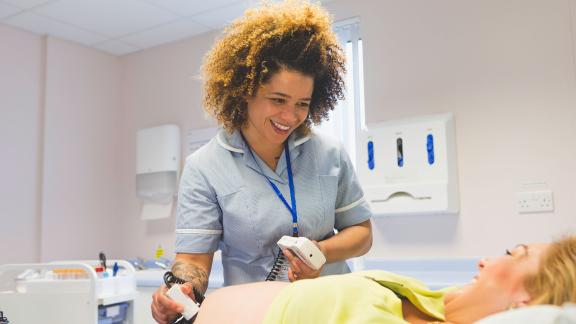Developing aspirant ethnic minority nursing and midwifery leaders : NHS England and NHS Improvement Midlands

Overview
The Developing Aspirant Ethnic Minority Nursing and Midwifery Leaders programme is being piloted in the Midlands region to support future ethnic minority nursing and midwifery leaders to develop leadership skills.
The programme was created by the Midlands chief nursing officer and chief midwifery officer’s ethnic minority delivery group, NHS England and NHS Improvement Midlands and the Midlands NHS Leadership and Lifelong Learning Academy.
Key benefits and outcomes
Although this is an ongoing pilot project, there are a number of anticipated benefits.
- Supporting the future of the NHS through inclusive leadership.
- Creating a powerful, regional support network of like-minded, influential leaders.
- Having a positive impact on patient care by helping staff reach their full potential.
What the organisation faced
Evidence such as the NHS Workforce Race Equality Standard (WRES), the Ten Point Race Equality Plan, The "snowy white peaks" of the NHS and The McGregor-Smith Review, have long highlighted racism in the NHS and the inequality of opportunities of progression for ethnic minority staff, including nurses and midwives. This programme aims to directly address that, alongside the current national priorities from the NHS Long Term Plan, NHS People Plan and the impact COVID-19 has had on ethnic minority staff in the NHS.
The evidence demonstrates that a diverse workforce, in which contributions from all staff members are valued is directly linked to good patient care. Working for race equality is rooted in the fundamental values, pledges and responsibilities of the NHS constitution.
Past learning shows that while leadership development programmes are great on their own, they are only part of the solution. Leaders need a combination of formal development, exposure to new work-based learning opportunities, the support to lead in new ways and safe spaces to network, share and learn with others, supported by an executive level sponsor.
What the organisation did
This new initiative combines formal learning from the NHS Leadership Academy Mary Seacole programme with nursing and midwifery specific activities, including clinical masterclasses, reciprocal mentoring, action learning sets, executive sponsorship, a support network, a leadership stretch assignment as well as financial and talent management.
All 11 systems in the Midlands were asked to communicate this initiative within their organisations and to encourage aspiring ethnic minority nursing and midwifery leaders to apply. Each system could submit up to six people to apply.
Recruiting managers for the programme then shortlisted from a robust criteria, to select one nurse and one midwife from each organisation across the region to start the programme. 22 people were selected.
Those that were not selected were provided with an alternative offer of development opportunities within their organisation and regionally/nationally which included coaching, mentoring, support to join alternative leadership programmes and conversations at a local level about development opportunities.
The programme
The one-year programme asks participants to commit to a minimum of 23 days per year for external study and one flexible day per week for stretch. It aims to provide the cohort with the theoretical knowledge and practical understanding needed to deliver inspiring leadership.
At the start, the cohort are provided with a programme handbook so they can familiarise themselves with the structure of the programme straight away. This includes a clear timetable of activities month by month, which are confirmed early in the programme to allow for clinical rostering.
Activities throughout the year include:
- an onboarding session
- a stretch assignment
- writing Skills workshop
- enrolment on the Mary Seacole programme
- reciprocal mentoring sessions with executive sponsors
- action learning sets
- career development workshops
- a series of clinical and non-clinical masterclasses
- a celebration event
- alumni support.
Where possible, activities are delivered by ethnic minority leaders so that participants have role models and can hear their development pathways.
Executive level sponsors from each of the participating organisations are also required and are integral to the individuals’ success on the programme. Sponsors are required to attend the onboarding day, support engagement events and the celebration event as well as engaging in reciprocal mentoring sessions with the participants. Sponsors will be asked to reflect on how they are adapting their leadership to become more inclusive. The executive level sponsor also commits to ‘unlocking doors’ for participants back in their organisations by providing enhanced learning and networking opportunities for programme participants, such as leadership shadowing opportunities.
Results and benefits
As this pilot is in its early stages, there are no clear results and benefits as yet, but the programme leads anticipate the following to be achieved.
- Positive action taken to provide aspirant nursing and midwifery leaders with the skills, confidence and resources to develop and progress within their careers at system level.
- The nursing and midwifery leadership talent pipeline diversified.
- Commitments in the Workforce Race Equality Standard, NHS People Plan and NHS Long Term Plan supported.
- Diverse leadership which is able to make decisions effectively for the benefit and needs of the diverse community they serve.
- Powerful, regional support network of like-minded, influential leaders created.
- A positive impact on patient care by helping staff reach their full potential.
- Positive and productive changes brought by participants to their teams, services and patients including increasing staff morale and improving patients’ experience.
- Creation of an active ethnic minority talent management initiative, identifying other talented staff via the application process, in addition to those who are successfully accepted on the programme.
- Competent ethnic minority emerging leaders who inspire others within the organisation.
- Retention of talent and monitoring and tracking of career progression.
- An increase in the number of capable leaders in the pipeline due to better succession planning.
- Increased cultural awareness and inclusive leadership skills among executive sponsors.
Overcoming obstacles
As this is a new pilot programme, the obstacles encountered have been minimal but there have been many points of learning for the next cohort. There were a few issues during the application process. It was found the submission time was too short for some applicants to submit their interest, as there was a delay in cascading information to line managers and waiting for their approval. Next time the submission time will be increased, and the programme will remove the requirement for line manager approval before applying.
Some applicants who were strong missed out due to not matching directly with the shortlisting criteria, therefore next time the programme will make the criteria available in advance to help more applicants succeed.
There was a feeling that applicants who were unsuccessful in joining the programme should receive some more structured support to encourage their leadership aspirations. Midlands systems are being encouraged to provide learning and development opportunities to those who are unsuccessful in application process.
Takeaway tips
- Where possible run activities which involve ethnic minority leaders.
- Work with ethnic minority nursing and midwifery leaders and allies to determine which activities would provide the greatest development opportunities and exposure during the programme.
- Executive sponsorship support throughout the programme is fundamental.
- Provide support and learning opportunities for sponsors too, so that they’re clear on their responsibilities.
Further information
For further information about this work, contact Tom Warner, Nurse Equalities Manager, NHS England and NHS Improvement on thomaswarner@nhs.net



